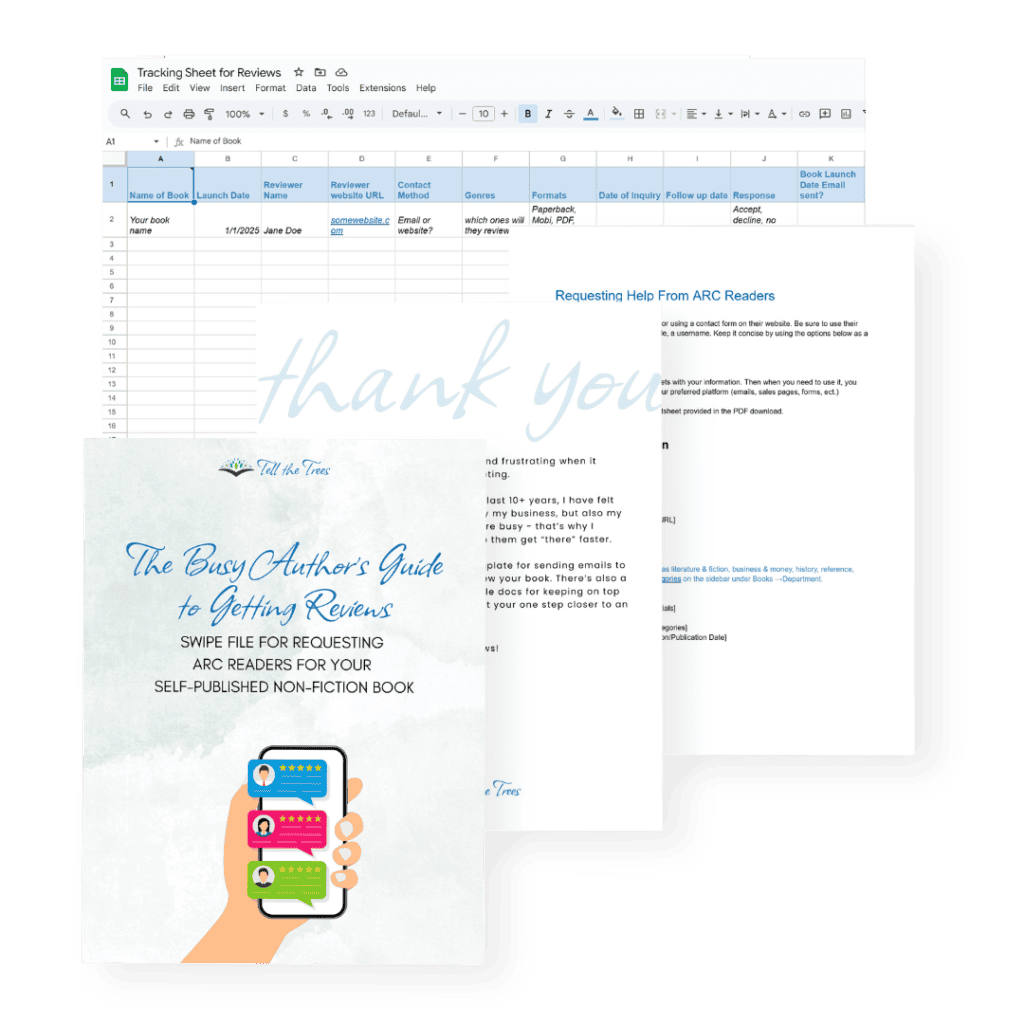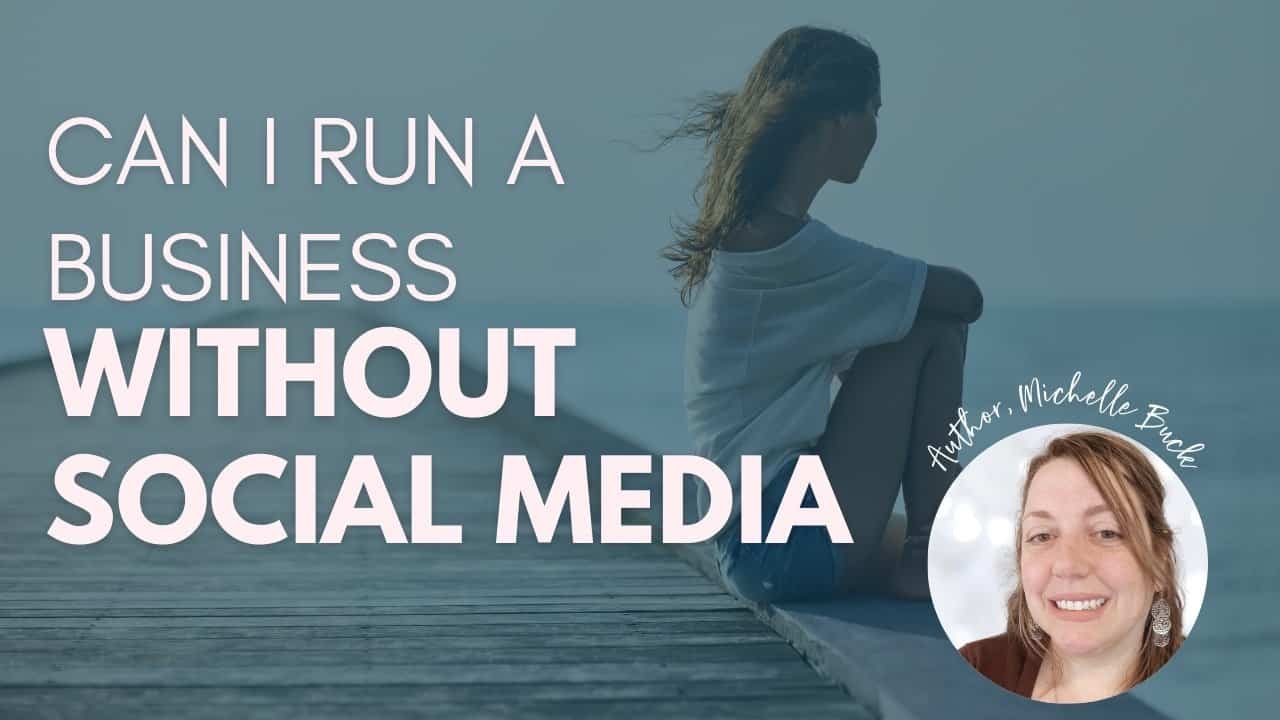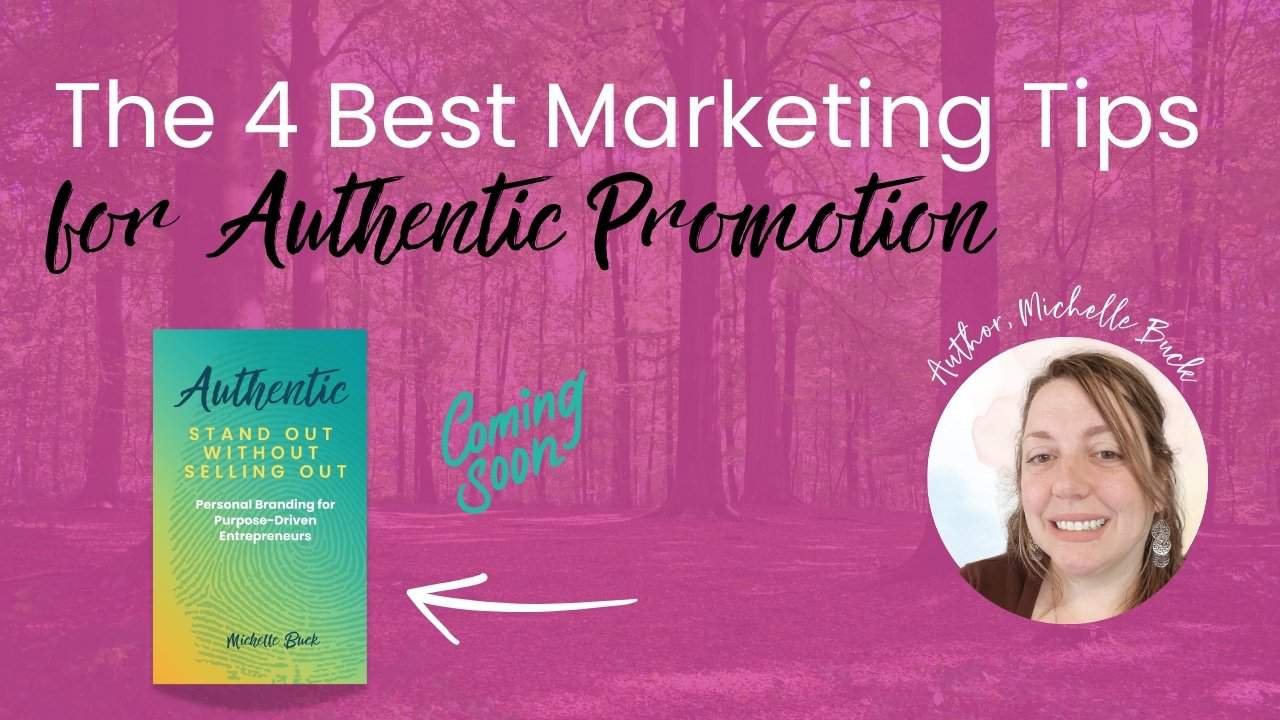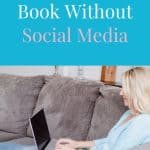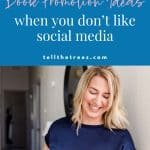by Michelle
Share
by Michelle
Share

Most of the gurus will tell you that you need social media to market your book. When I started this website, I was intent that I wanted to write more about marketing and less about self-publishing. After all, there is a plethora of blogs out there dedicated to educating new authors about self-publishing. My focus was more on marketing and promotion and less on the actual self-publishing part.
But the more I used social media, the more I found my mental health suffering. Before I was writing full time, I was a Marketing Specialist and was overworked, stressed out, and micromanaged. My opinions and ideas were squashed. I felt like my creativity took a nosedive.
When I left, I wanted a change. I wanted a big window that looked out at the trees, where I could write and think and there wasn’t the pressure of micromanagement. The ability to focus on projects I cared about and I could contribute to was the most important for me. I wanted to strip away anything that destroyed my peace and ruined my sense of calm – or at least limit it to very small amounts. That was the goal.

Social Media vs. Your Mental Health
Lately, I feel like social media is just another toxic workplace: random strangers criticize my ideas, I’m chasing the algorithm, and my creativity is suffering because of it. Everything I had learned about marketing taught me to put myself out there, be on various platforms, and show up for my audience.
I’ve been wondering if there’s a better way. What if I could create and write and spend less time on social media?
Being on social media is the exact opposite of my personality. In exchange for being on social media, I had to sacrifice the things I care about the most. It also was information overload because I was scrolling through crap to get to the “good stuff”. It’s way too easy to get sucked in and before you know it, an hour of my life was gone. That’s because social media is addictive, and these platforms are hoping you’ll stick around to consume ads, content, and more so they can make money off your addiction.
What the Experts Say About Social Media
On average, most people spend about 2 hours and 23 minutes a day using social media and most of it is consuming video content and reading news. (Source: Priori Data)
Scholars are analyzing social media and studying its effects because of how many people are using the platform. The NIH notes females are more likely than men to experience mental health issues from social media use, mainly anxiety and depression. In fact, the NIH states:
“The prominent risk factors for anxiety and depression emerging from this study comprised time spent, activity, and addiction to social media.”
My conclusion is the more time you are on social media trying to manage your image, the more likely your mental health will suffer. And that’s not what I want for my life.
If you are nodding in agreement to any of this, ask yourself if you are seeing real benefits from your social media presence.
To be clear, I’m not saying to get rid of every social platform (unless you really want to). But I suggest you pick one or two and only use those.
For my business, I wanted to use platforms that closely fell in line with my goals and the comfort of use.
For instance, I simply don’t like Facebook. I have had nothing but issues with Meta and trying to use the business side of things. For me, it’s just purely frustrating, besides being one of the top platforms that is shown to cause mental health issues. So, while I have a Facebook page, I don’t use it very much at all.
I tried to use Instagram and Threads and found both are not to my liking.
Think about the platforms you use. Which ones do you actually enjoy using? That’s a good place to start.
Social Media Platforms for Your Audience
Now let’s look at your audience:
- Who is my target audience?
- What age group do they fall into?
- What is the genre of your book?
If you know the age group and other details of your target audience, you might lean towards one social platform over the other. For instance, if you write fan fiction for Twilight, you might find yourself on Tik-Tok where other readers would likely hang out. On the flip side, if you write about politics and news, you might enjoy using Twitter or Threads.
Your Content
Now let’s look at the type of content YOU enjoy creating.
- Are you comfortable creating long-form or short-form content (or both)?
- Do you enjoy creating videos and editing content?
- Are you more comfortable with static images or dynamic content?
- Do you enjoy live interactions with your audience?
- Are you tech savvy or want to learn new technology?
For these questions, let’s look at each one.

Long Form Content vs. Short Form Content
If you enjoy writing long-form content, but not short-form, you’ll probably dislike platforms that have limitations on what you post. For instance, Tik-Tok is often short videos and not geared towards educational or longer form content. It’s short and pithy, as well as entertaining. If your focus is more educational or you like posting a lot of words, then Tik-Tok would not be the best choice for you.
- Twitter (X), Threads, or Tik-Tok – Great for short-form content
- YouTube, Facebook – Best for long-form content
Creating Videos vs. Creating Images
If you prefer to create or edit videos instead of editing images or graphics, then you have some options for platforms that are good at both. Obviously all platforms are good for both photos and video with Reels and Stories that allow you to post content, so think about which ones you prefer using.
- Facebook, Threads, Twitter, Pinterest, Instagram – Useful for basic image editing and visual storytelling with images
- Instagram, Pinterest, Tik-Tok, and YouTube – Best platforms for more creative videos such as trendy short form video creation, quick editing, and behind the scenes glimpses.
Tech Savvy Social Media Platforms
Those who are tech-savvy or want to be tech savvy will find Tik-Tok, Instagram, and YouTube a satisfying choice. Not only can you learn about the video and editing tools for each platform, but you can also learn about new trends that incorporate visual storytelling. For live interactions, Facebook, Instagram, and even Tik-Tok are great for going “live” on video and interacting with your audience.
Focusing on What Matters
If you rather pick food out of your teeth than use social platform, then let’s talk about other ways to promote your website, writing, and books. Social Media is not the “be all, end all”. It’s just a quicker way to build an audience. But it’s not always the best way.
My focus has always been my writing. I want to write, research, create, have time to think through ideas, and enjoy my life. I do not want to sit on social media arguing with a keyboard warrior about random issues that do not matter.
While I do plan on using Pinterest and YouTube, I am mainly focusing on what I want to do more than how I want to promote.
Focusing on my website
Since I enjoy writing, my website is where I host my writing materials, whether that’s a blog post, a resource, or my books. My email list is also where I share my content, so I focus on the content on my website as well as what I share with the email list. These two things bring me the most joy because I get to write what I want and I get to create what I want. No one is standing there ready to pounce on me – and if they are, they can just unsubscribe.
Email List Building
I haven’t done this yet, but one idea is to build your list at in-person events. You could even create a business card with a QR Code and allow people to sign up to your list. Or, offer a giveaway such as a free book and gather emails that way. While writing this post, I found a local writing group that meets twice a month. I’m hoping to learn from the group but also find ways to naturally promote my work.
Another way is to share your content on platforms like Medium that allow you to import your posts into the platform and even get paid a little if others read and engage. You can build a newsletter on Medium and others can follow and subscribe to you.
Book Promotion Websites
Use sites that work within your genre. You can reach readers without all the personal contact and engagement. Consider these websites:
Other Ideas for Marketing without Social Media
- Multi-author events
- Collaborate with other authors
- Connect with local bookstores for book signings
- Reach out to writing clubs, book clubs, or libraries
- Appear as a guest on a podcast
- Book Fairs or Conventions
- Optimize your book with keywords and metadata (Pinterest, Amazon, ect)
- Join online forums that focus on writing and self-publishing
Why Pinterest Works For Me
Pinterest is not a social media platform like Facebook or Instagram. Most of what you see on Pinterest is positive and not likely to demand back-and-forth conversation. Instead, it acts much like Google does. You search for something you want to learn or know about and you get results which are graphic images that showcase website content or products. When you click on that graphic and visit the website, you either get an article or a product you may have been looking to buy. Pinterest is a place to go for answers, not a place to argue or debate, or worse, to get ridiculed by random basement dwellers. Pinterest is often a safe space and is a pleasant experience for women, especially.
Not everyone needs to use Pinterest, but I enjoy using it because it bodes well with my ability to write and create without having to be on camera. In fact, I wrote a book about how to use it for your business (or book) with tips for getting started and a plan to see real results.
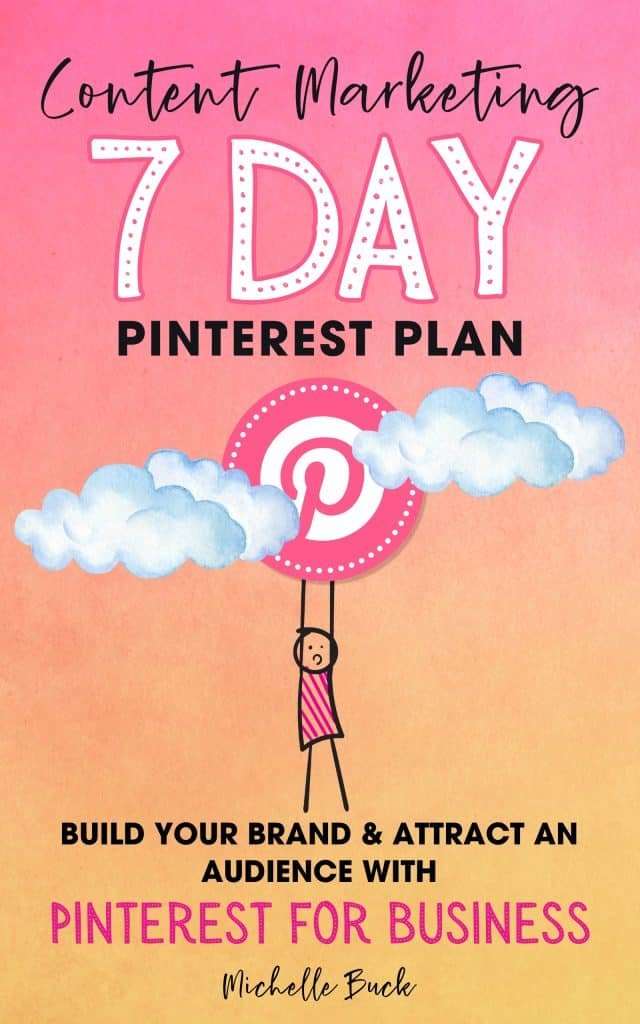
Social Media Use
While social media platforms are here to stay, if you find yourself not enjoying them, there are other ways to promote your work and books. You don’t need to bow down to the Almighty Algorithm. Look for in-person events or focus on platforms that don’t require constant engagement. Consider guest posting and pitching ideas to a podcast. And don’t forget about platforms like Goodreads and Amazon Author Central, where you can grow followers without having to “live” on the platform.
With social media, finding one or two platforms that you enjoy using is key. Factor in where your audience is most likely to hang out. You can get traction by repurposing your content to places like Medium, or breaking your content into bite-size pieces for the platforms you do like using.
Most importantly, listen to your gut instincts. If you feel as if a platform is too much, then step back and re-evaluate using it. There are all kinds of ways to get your book and ideas out there. Social media is only one way – but it isn’t always the best way. Your mental health and wellbeing should come first.
Tell the Trees is supported by its readers. When you make a purchase using links on this site, it may result in affiliate commission. Please visit my affiliate disclosure page for more information.
Let's Discuss It
For fellow introverts, old souls, and sensitive creators feeling trapped in this cycle: there is another way. You don't have to participate in the content creation marathon if it drains your spirit. Sometimes the bravest business decision is choosing to build connection on your own terms.
While working in the corporate world, it wasn’t long before I realized the “best marketing tips” were actually quite inauthentic. The slow grind of trying to weigh my personal core values with the values of the company left me off balance in my career choice. Did I really want to take part in pulling the
In using ChatGPT for Pinterest marketing, it’s not only useful for things like Pinterest keywords but also for strategy, visual imagery, and improving copy.
A brief interview: The Self-Reliant Entrepreneur by John Jantsch offers entrepreneurs a guide for tapping into the wisdom that is most relevant to the entrepreneurial life.

